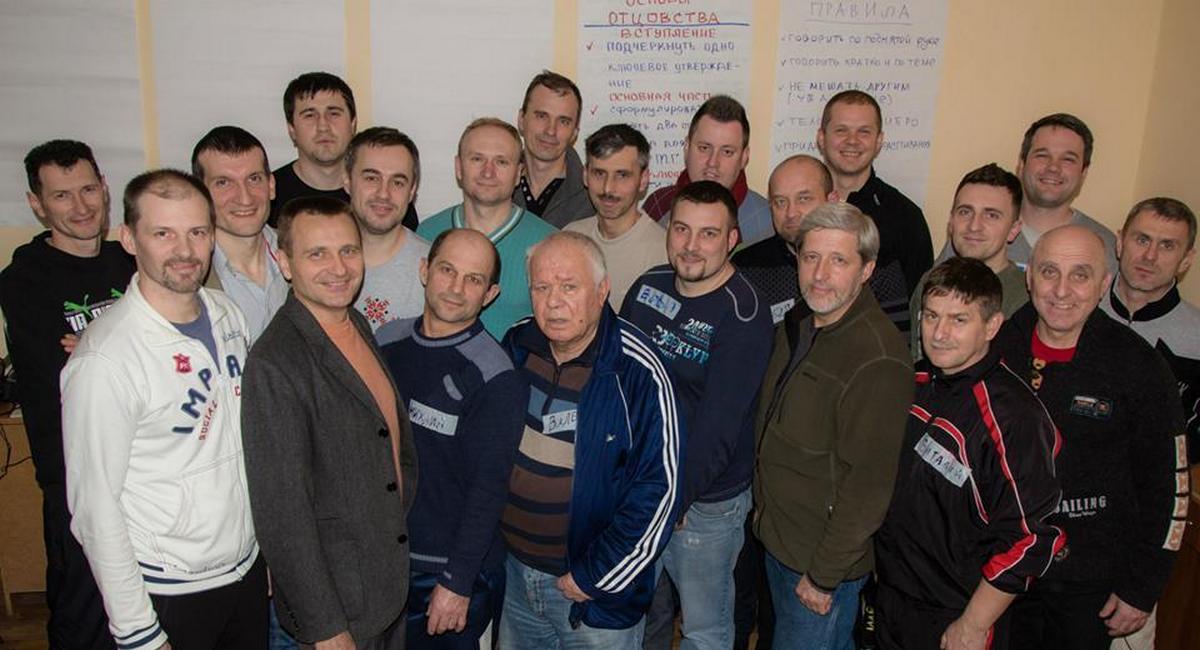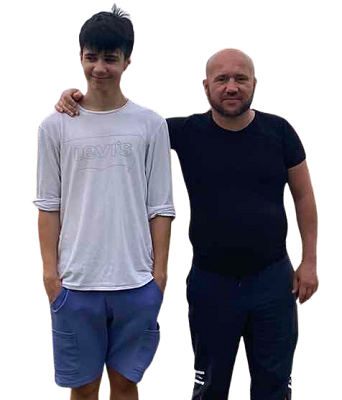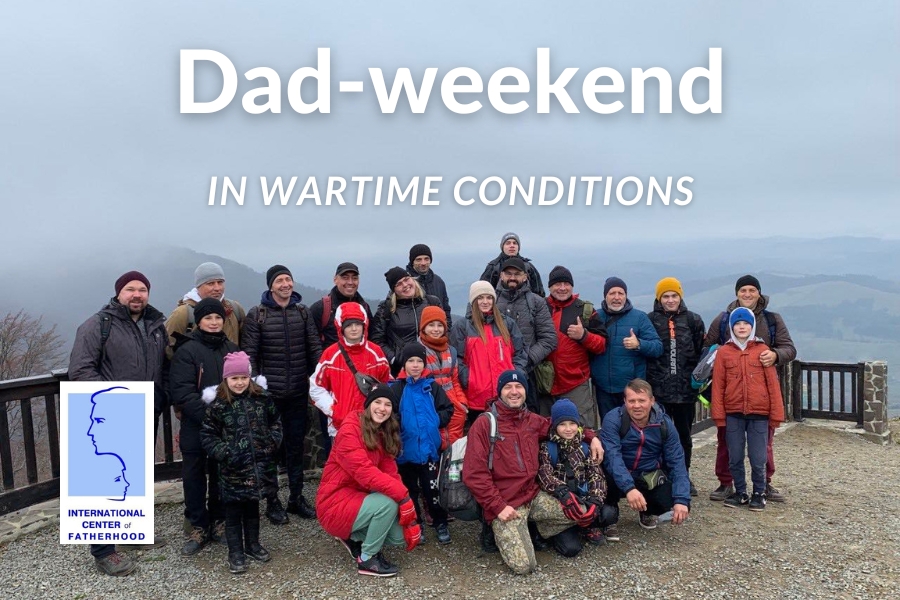
ICF ministry report May 2016
May 18, 2016
“Dad’s Workshop” in wartime conditions
March 22, 2023The training course “Fundamentals of Fatherhood” was created by our center 20 years ago with the aim of helping men to understand their own role as a father, their responsibilities to the family and responsibility for building relationships with children.
During the course’s existence, more than a thousand Ukrainian men who already have children or are just planning to become fathers have passed it. Organizers and moderators of “Fundamentals of Fatherhood” emphasize the importance of father`s care, participation in children’s lives, quality marital interaction, and, in general, the ability of a man to analyse his own actions as a father.
Therefore, the mission of the course is very important and relevant for Ukrainian society, which is traditionally used to pay attention only to the issue of motherhood, as if relegating fathers to secondary roles. “Fundamentals of Fatherhood”, being one of the first serious and influential projects dedicated to the development of Fatherhood in Ukraine, is designed to draw society’s attention to the current strong “mother-father” imbalance in it, and to draw attention to the importance and necessity of building parental relationships with children.
The training is structured in such a way that men, united in a certain group, are able to regularly meet, communicate and exchange their own parenting experience, their mistakes and successes. As for the moderators of such groups, their main goal is to encourage fathers to apply the knowledge and skills acquired during the course. And although in the conditions of a war in Ukraine, the moderators of “Fundamentals of Fatherhood” were forced to resort to many serious changes, the course continues to exist, and Ukrainian men do not lose their interest in developing and improving relationships with children.
Dmytro Khimanin, a master trainer of the our center, who advises activists who want to hold “Fundamentals of Fatherhood” courses for men. Currently teaching men online. He also has volunteering experience in Cherkasy.

Please tell us about your experience of training future moderators? Did you have any difficulties related to conducting training in distance mode?
Dmytro Khimanin: To be honest, it is not so easy to gather the men themselves for training. They are all booked in advance. By the way, we offer them training books for free. We actually send a group training book to anyone who is interested in learning. Usually, men are very happy to receive it. They then sign up for a Zoom learning conference where they can find out that they will be leading the group.
Not everyone is immediately able to believe that they will be able to cope, since at the beginning many have the impression that working with people is very difficult task. In fact, there is nothing difficult in this, because the individual study guide is created in such a way that men can learn on their own. The man who is the moderator of the group only needs to manage the process itself.
I remember, by the way, that in some year, 2018 or 2019, the International Fatherhood Center developed a video presentation for direct training of group moderators. This greatly facilitates the process of obtaining knowledge today. So, the men now watch the video, write down their questions, and, in principle, this is enough for them to start leading their groups.
If we talk about the existing difficulties associated with this form of education, it is mainly a matter of time that men are ready or not ready to devote to attending online conferences. And, of course, it is also important how much time they devote to learn everything, getting motivated and, as a result, recruiting the group itself. Therefore, at such video meetings, we had several men who, after undergoing training, recruited their own groups of approximately 5 people. For the most part, such groups were formed in the west of Ukraine.
The second difficulty now is also the fact that the majority of fathers are very heavily burdened with the question of how to provide for their family, or are directly on the front line.
What are the specifics of training men in wartime?
Dmytro Khimanin: It is difficult to say anything about this, because nothing works the way it used to. You can no longer just go out and say “Dear fathers, please come to the course… Education is no longer collective, but rather individual. It is like, you can see a certain person who has a corresponding need and offer him your help in the form of personal regular meetings. Now there is no such thing as one of the men coming to the group once a week, in order, according to the tradition of our course, to discuss how he spent that week with his children. Now, it seems to me, it is simply physically difficult for a man to afford it.
Oleg Rabochauskas, volunteer in Lutsk. In the past, was held training for the moderators of the “Fundamentals of Fatherhood” course. This fall, he taught refugees according to the course program.

What exactly motivated you to become a fatherhood group moderator?
Oleg Rabochauskas: Due to what has been happening recently in our city, there have been many temporarily displaced persons and, of course, there were men among them. I began to miss the courses, the communication with other dads. and therefore, decided to invite them to a new group. 12 men signed up, all of whom made it to the very end, to the last class. Among them, 7 people were local, and 5 from the Eastern regions of our country.
To be honest, when I encourage other men to learn and learn simple but profound truths, I myself somehow get fired up with the desire to give them the best parenting courses possible.
What were the results of your work with men? Could you give some examples of how their lives have changed as a result of the course?
Oleg Rabochauskas: Even before starting this course, I had the idea to do something unique. Later, I decided to hold 8 mandatory meetings in different places, at different locations. Our meetings took place in the church, in the children’s development studio, in the Korsaki Museum of Modern Art, and more than once at home.
The essence of this idea was to show fathers that they should spend all their time not only at work, not only at home communicating with their children and wife, but also can visit many other interesting places. For example, in a child development center, development is usually done by mothers, so a trip to such a place helped men understand that this is also their task. Many dads were also very surprised that in our city there is a modern and interesting museum where you can have such a good time, where you can show and explain to children things that are very important for their moral and social development by using art.
What are the features of working with fathers in wartime?
Oleg Rabochauskas: War is the time when children especially need father`s care. News and extraneous conversations put certain experiences in children’s hearts. Today, our children don’t just play “war games”, they see all this horror through their eyes and their souls. Now the father is simply obliged to teach children to experience this pain and suffering together, which, unfortunately, is currently presents in the hearts of children.
Do you plan to continue recruiting groups of men for training?
Oleg Rabochauskas: Now we have a period of various holidays, but the holidays will end soon and it will be time to work and study, to learn something necessary. Therefore, of course, soon we plan to recruit new training groups for the “Fundamentals of Fatherhood” course. Maybe it will be in the spring, but we are not sure yet.
After interviewing the moderators of the groups to get a better understanding of what the “Fundamentals of Fatherhood” training is all about, especially now, in wartime conditions, we decided to also turn to a few men who have gone through the course themselves and are ready to share their reactions.
Ihor Levchuk, 38 years old, has one son, who is currently 16 years old.

Ihor Levchuk: I became my son’s friend, found out who his best friend is, what interests and hobbies he has, what he likes, his goals and plans for the future. In short, we became real friends.
By the way, thanks to Oleg Rabochauskas for this course. I am divorced from my wife, but I believe that God will give me a new family in which I am already prepared to become a father again.
Vadym Saranchov, 29 years old, has two children.

Vadym Saranchov: I have a lot that has changed thanks to the “Fundamentals of Fatherhood” course. I have more understanding in the family. There were fewer quarrels. With the children, we began to find a common language and play more, that is, everything changed for the better.
By the way, Vadym’s son added that he really likes the fact that his father started going to the father`s center. Actually, such sincere reactions of children and their happiness from the relationship with their father are the main goal of the project.
Of course, we all would like to see more and more courses similar to “Fundamentals of Fatherhood” appear in Ukraine in the future and simply activists who would really be interested in spreading the ideas of responsible Fatherhood among our compatriots, which is especially important in the war and post- war time, Children are currently even more in need of father`s attention and love, a sense of support and protection, even if dad is at the front or simply at a distance and is able to maintain communication only remotely.


